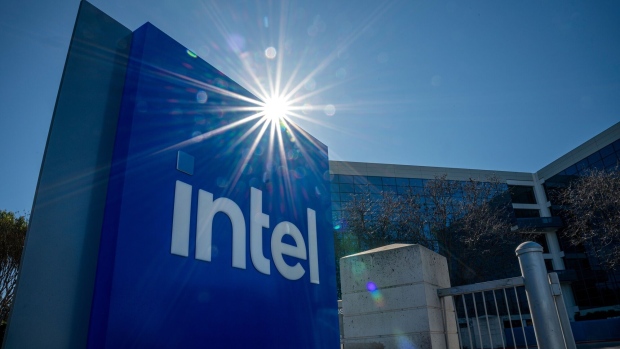Jun 15, 2023
Intel Set to Gain $11 Billion in Subsidies for German Chip Plant
, Bloomberg News

(Bloomberg) -- Intel Corp. is set to receive almost $11 billion in subsidies from the German government for a chip manufacturing complex in the eastern part of the country, according to people familiar with the matter.
The company postponed the start of construction at the plant — which it had previously agreed to build in Magdeburg with €6.8 billion ($7.2 billion) in government aid — at the end of last year because of economic headwinds and had been asking for more funds, people with knowledge of the situation said. Germany has now expressed a willingness to grant roughly €10 billion as part of negotiations, people said, asking not to be identified because the information isn’t public.
Read More: Intel Plans $4.6 Billion Polish Fab as EU Hub Picks Up Pace
Negotiations on the subsidies are likely to stretch into the weekend and an official announcement may come as early as Monday, one of the people said.
Germany remains in “intensive” negotiations with Intel over the subsidy, a spokeswoman for the economy ministry said in a press conference on Friday, declining to comment on the “numbers which are circulating.” German Chancellor Olaf Scholz will host Intel Chief Executive Officer Pat Gelsinger in Berlin on Monday, another spokesman for the government said.
“It’s good news that many companies are currently making big investment decisions with regard to the semiconductor industry in Germany,” Scholz said an an earlier event. “If all these plans become reality, a lot will come together here. And with some we are talking in detail.”
Under Chief Executive Pat Gelsinger, Intel has embarked on a massive buildout aimed at regaining its industry leadership and diversifying the manufacturing hubs for critical components, which are currently concentrated in East Asia. Magdeburg was chief among those plans after it outbid other sites in Europe. Since then, energy prices have become extremely volatile, and inflation has sent the costs of construction and materials soaring.
Intel deferred to the German government for comment.
Scholz’s government is willing to grant more state subsidies to the US company — but only under the condition that Intel significantly increase its overall investment for the factory, one of the people familiar with the talks said. The state aid will come through a variety of mechanisms including price caps, one of the people said.
Handelsblatt reported earlier on Thursday that Intel and the government have agreed to an increase in government aid for the plant.
Read More: Germany Gets New EV Chip Plant in Scholz’s Push for Industry
Intel had originally estimated that the project in Germany would cost €17 billion but now expects to spend €30 billion, according to people familiar with the situation. Like most projects that will receive government funding through the EU’s Chips Act, Intel was expecting roughly 40% of its project to be subsidized, the people said.
Read More: Intel Seeks Salvation in This German Town of Boom-to-Bust Cycles
Intel announced an expansion across Europe last year that, at the time, was worth €33 billion, including a research center in France and an expansion of its existing chip facility in Ireland.
Those plans are facing delays just as the US is pressuring other nations to help keep China’s chipmaking abilities from advancing. Last year, the European Commission announced a plan, called the EU Chips Act, to pour €43 billion into the semiconductor industry on the continent. The US similarly laid out a $50 billion plan to subsidize its own domestic production.
--With assistance from Kamil Kowalcze and Arne Delfs.
(Updates with German government response on Friday in fourth paragraph)
©2023 Bloomberg L.P.





